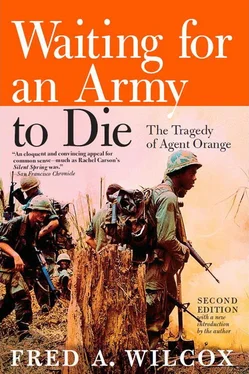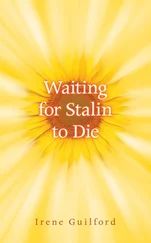While the VA argued that the suspension order was “premature” and continued to promulgate its policy of “no health effects” from Agent Orange, Cleland’s public statements were based in part on a 1974 study of herbicide use in Vietnam by the National Academy of Sciences. But in his zealous use of the NAS report Cleland seemed unaware that the academy’s president, Dr. Philip Handler, did not share his absolute certainty that Agent Orange was harmless. Testifying before the Subcommittee on Medical Facilities and Benefits of the Committee on Veterans’ Affairs, Dr. Handler said: “At the time the NAS report was issued, I foresaw the serious implications of dioxin on human health. In a letter to Secretary of State Henry Kissinger, I noted: ‘… The hazard could well be serious and indeed is so regarded by knowledgeable individuals in this country as well as in Southeast Asia …’ Many of these issues are more sharply focused today.” 9
Dr. Handler also told the committee that the “perhaps limited data collected by the NAS committee failed to indicate direct damage by herbicides to human health.” However, there were consistent, although “mostly secondhand,” reports from certain areas of acute and occasionally fatal respiratory distress, particularly in children. There were also reports of “severe irritation to the eyes and skin, as well as digestive disturbances. However, no independent medical studies of exposed populations were available from the time of spraying, to confirm or deny these reports.” 10
One rather serious methodological limitation of the NAS study was that in 1974 the war in Vietnam was still raging, and considerable portions of the country were in the hands of the Viet Cong and North Vietnamese. Visiting scientists could not have expected to find archives filled with scientific information on the effects of massive defoliation on Vietnamese peasants and US military personnel. Vietnamese doctors, farmers, and mothers had been complaining about the suffering caused by the defoliation campaign for many years, but their complaints had been dismissed by American officials as enemy propaganda. Defoliation, according to Pentagon and government spokesmen, was taking place in only in areas “remote” from population centers, and neither American soldiers nor Vietnamese peasants were being exposed to the deadly rain for herbicides.
However, in Chemical and Biological Warfare , Seymour M. Hersh writes: “A 1967 Japanese study of US anti-crop defoliation methods, prepared by Yoichi Fukushima, head of the Agronomy section of the Japan Science Council, claimed that US anti-crop attacks have ruined more than 3.8 million acres of arable land in South Vietnam and resulted in the deaths of nearly i,000 peasants and more than 13,000 livestock. Fukushima said one village was attacked more than thirty times by C-123 crop dusters spraying agents more caustic then the arsenic-laden cacodylic acid.” 11
It is not clear whether a Japanese study of US anti-crop and defoliation methods would qualify as “independent” verification of what Dr. Handler had called “secondhand” reports; however, Dr. Handler did inform Congress that the NAS Committee “did not study or review the effects of herbicides on US military personnel who served in South Vietnam, nor had any reason to do so been called to our attention.”
In the process of reading and rereading transcripts of testimony by Veterans Administration and Department of Defense officials before congressional committees and subcommittees, one begins to feel the presence of a bureaucratic Dr. Jekyll and Mr. Hyde. At the hearings Dr. Jekyll is the epitome of bureaucratic finesse, his statements sensible, reassuring, supportive of veterans, and often promising. On May 6, 1981, for example, Dr. William J. Jacoby Jr., deputy chief medical director, Department of Medicine and Surgery, Veterans Administration, told a congressional hearing: “Mr. Chairman, I wish to state at the very outset that from the time this issue first began to emerge, the VA has taken a leading role in the government’s efforts to keep abreast of the problem. It is largely because of this visible, and therefore perhaps vulnerable, position that the VA has at times come under heavy criticism. I would submit, however, that despite perceptions to the contrary, this agency has remained faithful to its primary mission as the true advocate of the veteran. Within the body of law that governs its operations, the VA has made every effort and has embarked on a series of bold initiatives in an attempt to respond to the many and varied concerns of our Vietnam veteran beneficiaries as they related to the issue of Agent Orange.
“Further, we are firmly committed to the policy that all veterans reporting for examination and participation in our Agent Orange Registry will be treated with dignity and respect to which they are entitled. Every effort is made to ensure that from the time the veteran first enters a VA facility, to the conclusion of the physical examination, the experience is one which responds to medical or other needs in a compassionate manner.” 12
As ludicrous as Dr. Jacoby’s testimony must sound to many veterans, it is conceivable that the VA’s Washington headquarters issued orders to treat Vietnam veterans with “dignity” and “compassion,” and the regional staff were simply choosing to disobey. Might it have been possible that Dr. Jekyll just did not know what Mr. Hyde was doing outside congressional hearing rooms and the VA’s bureaucratic fortress?
But this theory is easily disproven by the administrator’s many policy statements—which, if followed by regional hospitals, would contravene any public declaration of his agency’s good intentions. Why would the regional staff bother to find out anything about the effects of Agent Orange on human health if Washington’s policy was to dismiss such complaints as unfounded? And how, after receiving the memo cited earlier, could anyone expect doctors and administrators to treat veterans with dignity and respect? One does not advise health personnel to consider their patients’ complaints as groundless and then expect those same doctors, nurses, and physician’s assistants to behave compassionately.
One of the most absurd arguments the VA uses to rationalize its behavior on the Agent Orange issue is that it has been unable to locate a “study population” that could provide “scientific verification” of veterans’ claims. The fact that a “study population” has been filing for disability, demanding medical care, lobbying the government, testifying at hearings, forming organizations and coalitions, and all too frequently, dying from cancer, seems to have escaped the VA. Had the agency really been interested in locating a “study population,” it might have held public hearings similar to those sponsored by the New York State Temporary Commission on Dioxin Exposure. At these hearings VA officials would hear grunts testify that they entered spray zones not six weeks after a defoliation mission, but on the very day of the spraying; that while guarding a base camp perimeter or on patrol they were soaked in herbicides jettisoned from C-123; and that since their return home they had been beset by a host of debilitating ailments. And the VA’s “no health effects” nonsense would be challenged by the sight of men who, when asked to give their ages, appear ten, fifteen, even twenty years older. These prematurely aged men tell a story that the VA has not wanted to hear. For example, one former combat infantryman told New York’s commission about assaulting a hill just seventy-two hours after it had been sprayed: “In October of 1968,” he testified, “we saw helicopters spraying intermittently in the valley in front of us. There were hills among us. Three days later we assaulted the hill before an artillery barrage hit it, and they napalmed it also. We assaulted the hill, and that night we slept on the ground, ponchos just covering us. At the time we saw the spraying, we thought it was nerve gas. We had no idea it was Agent Orange. No one had told us. That same night we also had to fight on that hill.
Читать дальше











